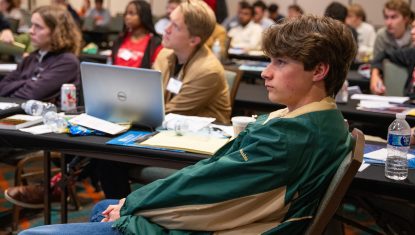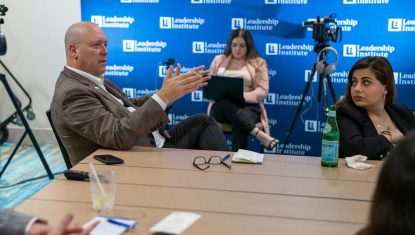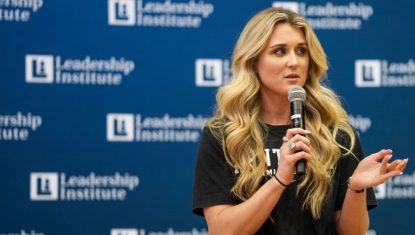Knowledgeable conservatives, in moments of candor, will admit our grassroots activity is far less today than a dozen years ago.Several causes come initially to mind:
We do not have a Ronald Reagan, persuasively reliable on all our issues, around whom to rally.
The success of conservative economic policies has brought an unprecedented period of economic prosperity, lessening our fears for the survival of the free enterprise system.
The success of conservative policies of peace through strength has helped engender the utter extinction of the Brezhnev Doctrine and hastened the collapse of much of the Soviet empire.
Our ancient leftist enemies have ceased to trumpet much of their old ideology and seem to be doing all they can to sound as if they are conservatives on many issues. Most of these causes are the natural results of successful policies of a newly formed, governing majority coalition, signs of the cyclical process familiar in a healthy, two party system.
When the threat perception declines, activists tend to lose much of their old enthusiasm. Coalition members tend to start bickering.But these reasons are not sufficient to explain the extent of the current decline in grassroots activism. New governing coalitions in the United States tend to last for a generation or two.Other factors are at work.
Today I intend to discuss two other factors, the increasing domination of political consultants and growing failure of conservatives to run candidates. These are factors which affect our opponents as well. But the extent of the damage done to us by these two factors is largely in our power to correct.
First let us consider the career path of a successful political consultant.
Here is what happens:A smart campaign staffer helps win a high visibility election and decides to become a consultant.
The new consultant is soon involved in another win or two and is suddenly able to sell his services to many campaigns.
While able to give his few, early clients a great deal of personal time, working through many levels of their campaign organizations, the consultant quickly finds it impossible to give the same type of service to half a dozen candidates simultaneously.
Unable now to supervise detailed operations involving many layers of people in many campaigns at once, the consultant directs his client campaigns toward media-intensive, rather than people-intensive activity. Media decisions are few in number. They require skill but little time.The consultant also realizes it is very much in his own financial interest to have as much as possible of his clients’ budgets spent on media. Most consultants take a 15% commission (over and above client-paid production costs and his retainer) from media vendors for all placements. The consultant knows he gets no commission for campaign funds spent on people-intensive activity, such as:
- Precinct organization
- Voter ID phone banks
- Voter registration drives
- Youth effort
- The election day process to get out the vote
With their budgets warped towards media spending, candidates and their in-state organizations are led to measure the progress of their campaigns only in terms of dollars raised and tracking polls. (When I ask a candidate in a close race how he is doing and he answers by first describing his fundraising progress, I know he is in trouble.)
In defense of his practices, the consultant develops an outspoken contempt for any proposal, significant campaign expenditures except for paid media.
Many of his clients lose due to their failure to organize large numbers of people in their campaigns. But some of his clients do win. These winners are the ones the consultant talks about as he recruits clients in the next election cycle.
Having helped several candidates, the consultant is likely to be hired again to run their reelection campaigns. The incumbents have the ability to amass huge campaign funds, often from local donors. Even in the closing days of a reelection campaign where an incumbent is virtually unopposed, the consultant has a strong incentive to urge their incumbent on to raise more and more money. Never mind that conservative candidates in other contests in the area might actually win close contests but for the incumbent’s having vacuumed up so much money from available donors. After all, for every additional $100,000 spent on broadcast media, the consultant will pocket a cool $15,000 plus his fees for creating any new commercials.
The consultant, now prosperous and enjoying a changed lifestyle, has ready access to and influence with some incumbent officeholders. He decided to branch out into lobbying, where his influence enables him to pull down some really fat fees from major corporations, trade associations and even foreign governments which have major financial interests in the decision of elected and appointed government officials. By now, most of the consultant’s income does not come from election campaigns. But he continues to take some candidates as clients, partly to keep his valuable ties with incumbents and partly because there are in each election cycle some rich candidates and others able to raise big war chests, which will be spent largely on campaign media, still a fine source of income for the consultant.
Every experienced conservative campaign activist has seen outrageous examples of this behavior. My luncheon for conservative campaign activists has met bi-weekly, without exception, since 1974. I keep close touch with the election process. I’m not raising this as a theoretical problem.
Not all successful consultants behave this way. A great many do. But others, particularly those who specialize in one or more aspects of campaign technology such as direct mail, telephone canvassing, coalition building and youth efforts, do not.
This growing problem with consultants has many bad effects:
- The unnecessary losses of many conservative candidates each year
- The looting of millions of dollars misspent on media
- The suckering of many right candidates who are falsely led by consultants to believe they can win
- The increasing perception that campaigning is mostly mudslinging TV commercials
- Worst of all, the general decline of citizen participation as activists and, often, even as voters in the political process
Historically, volunteer participation in elections is the greatest preparation for competent campaign management and good candidates in future elections. That source of new activists and candidates is drying up.
Can grassroots activists do anything to limit the damage done by the increasing dominance of campaign consultants? Certainly.One big reason for reliance on campaign consultants is the increasing complexity of modern election technology. But in the years leading up to the election of 1980 conservative organizations ran massive political education and training efforts. Activists were prepared by the thousands. That grassroots infrastructure building should be vigorously resumed.
If you are a donor to a conservative organization you should demand that a substantial portion of its budget should be spent on increasing the number and the effectiveness of its activists. If a group fails to do this, give to other groups instead.
If you are a donor to a party organization, demand that it spends your money, in part, on a serious program of political education and training. There is hardly any area of political technology which cannot be mastered by a willing local activist. The Republican party was spending a much higher percentage of its revenue on political education and training twenty years ago than it is today. The GOP is giving only peanuts to its volunteer base.
Be careful that the training programs actually teach useful skills. Many seminars which purport to teach local activists are taught by consultants not interested in preparing volunteer competitors. Such programs serve only to teach the participants that the consultant knows his topic and is worthy of hire.
If you contribute to a candidate, you have the right to demand that his campaign give a healthy budget to people-oriented programs: precinct organizations, women’s activities, youth efforts, etc. These activities build grassroots infrastructure like no others.
Let us now turn to the problem of the growing failure of conservatives to run candidates.
More and more it is proving impossible to recruit conservative candidates against incumbents or even for open seats. Challengers for even local incumbents often cannot be found.
The next Congress will have only four Republicans among the ten congressman from my home state of Virginia. But ten years ago we elected nine of the ten. And the lone Democratic congressman was more was more conservative than some of the Republicans.
And all six of the Virginia Democratic congressmen are quite leftist by Virginia standards. And, what is worse, far worse, is the dreadful fact that we did not run Republican challengers against any of the five incumbent Democrats. They got off scot free.But don’t for a moment think the Democrats gave our five incumbent Republicans a free ride. No, there were Democratic challengers to all five of our congressmen. And the challenger who beat Congressman Stan Parris reportedly raised more money than any other challenger against a Republican incumbent in the United States this year.
This problem in my state is typical of the situation in many parts of the country.In fact, there is a fundamental misconception which is shared by many conservatives and many Republican leaders. This political error is not unique to Virginia. It is, I believe, a misunderstanding of how best to build grassroots strength through running candidates.
Too many of us think we should run a candidate only when we think there is a good chance we can win the election.And, since nobody believed we could beat any of the five incumbent Virginia Democratic congressmen, nobody ran against any of them. I submit that, in the case of these ten congressional races, the Democrats acted smarter than the Republicans.
- But not running a candidate often sounds so reasonable, doesn’t it?
- Why spend the time and money it takes to run and almost surely losing race?
- Why ask a candidate to take on an almost surely losing candidacy?
- Why embarrass the party or the conservative cause by losing badly?
- Why take the chance of diverting resources from our candidates elsewhere who have a chance to win?
- Why anger a safe incumbent opponent?
- All these sound like pretty good reasons not to challenge apparently safe leftist incumbents, don’t they?
Many Republican incumbents, in particular, don’t want to rile many of their Democratic colleagues by challenging them.And most of those arguments sound just as good as reasons not to run a candidate in an open district where the leftists seem virtually certain to win.
Yet those are arguments which ultimately lead to slow growth, no growth and eventual decline of a movement or a political party.
If conservatives in Virginia had operated in this fashion for the past 25 years, Republicans would not have won our first U.S. Senate race, the party would not today hold even four congressional districts and the party would not have the record strength it enjoys today in Virginia’s General Assembly and in local offices.Take for example my own congressional district, the Tenth. Conservative Republican Frank Wolf was an unknown in 1976 when he first announced against the incumbent leftist Democratic Congressman Joe Fisher. Frank Wolf campaigned hard but lost the nomination to a state legislator, who was then beaten by Congressman Fisher in November.
Frank Wolf again took on this seemingly hopeless task in 1978. He was nominated and did better than the state legislator had two years earlier. But Wolf lost again in 1978.
Finally, in 1980, frank Wolf won both the nomination and, narrowly, the general election defeating the incumbent who very few people thought was vulnerable four years earlier.
The two earlier races had so weakened the leftist Democratic congressman and so strengthened our organization that we were able to take the district. We have been winning it by convincing margins ever since.Think about this seriously. Everyone who knows much about politics knows of many cases where races against supposedly entrenched incumbents weakened the incumbents so they could be defeated in subsequent elections.
Isn’t that a fair situation? Isn’t that a strong, solid reason to run candidates, almost an obligation to run candidates, even when there is thought to be no chance to win in the current election year?
The best known political consultants, by the way, usually advise against running candidates who are very unlikely to win. But such candidates provide the big consultants with no revenue, except in case of rich, hopeless candidates. In this latter case, consultants are often willing to take them as clients. Often to “take” them in both senses of the word.Conservatives who know how important it is to build for the future also know how a losing race can soften up an opponent for future defeat, build credibility for our challengers and build strength of our own organizations. These are powerful reasons not to leave vacant places on the ballot.
While we know of losing races which made possible later victories, there is another situation which often occurs.Some conservative activists can remember our Virginia United States Senate race in 1972. An unusual congressman from the Eighth District, Bill Scott, made what most so-called “experts” thought was a hopeless race against the supposedly invulnerable incumbent, U.S. Senator Bill Spong.Now not everyone thought the Scott for Senate cause was hopeless. A conservative Republican leader, Richard Obenshain, thought this so-called “impossible” race was actually winnable. So he set out to win with Scott, certainly one of the most difficult candidates our party has fielded in our lifetimes.But Dick Obenshain was a political genius who saw opportunities where others saw only problems.
Bill Scott won. Six years later he turned his U.S. Senate seat over to another Republican whom many of us hoped would have been Dick Obenshain.Senator John Warner won very narrowly in 1978, winning again in 1984 by a big margin. This year Democrats did not challenge Sen. Warner, which is great for Republicans and, in my opinion, bad news or Democrats.But we should remember that almost everyone at first thought Bill Scott could not win this seat when he ran for it 13 years ago.
Please think about it. How many times have you, yourself, been pleasantly surprised when a race supposedly hopeless for us has resulted in a thrilling conservative victory? Most of our best conservative members of both houses of the Congress first won in just such circumstances.
Sometimes the leftist nominee self-destructs unexpectedly.
Sometimes our candidate and his campaigns turn out to be much better than we expected.Surely all of us can think of predicted losers who instead became glorious winners. It that not therefore another good reason to run candidates whom we really don’t expect to win?
Frankly, looking at the ten congressional districts in Virginia today, how the Democrats treated us and how we treated them, it’s a scandal that we have left all their incumbents unchallenged. At the congressional level, Virginia has only a one and a half party system in 1990. How about your state?This situation I call a scandal is not to be blamed on any particular party leaders at the local or state levels. The general idea of not challenging supposedly invulnerable incumbents is common almost everywhere in our country.In my home county of Arlington, our party has very often in recent years failed to run candidates against many of the worst leftists in Virginia. There is plenty of blame to go around. And I’ll accept my share.
What I am proposing today is not recriminations but a badly needed change of policy, a change of our behavior.Let me put it clearly. Not running candidates is almost worse than putting up losing candidates.Sometimes we produce upset victories.
Sometimes we build up candidates for future victories.Always we involve new people who can later help us win future victories.
Always we force the opposition incumbents to gather and spend for themselves some resources which might otherwise be spent against our conservative candidates elsewhere.
Not running candidates is no way to build a movement or party.If one chooses to be active in a party structure, one necessarily must support that party’s incumbents except in extraordinary circumstances. But conservatives primarily active outside a party structure are free of most such constraints.In sum, conservatives should run candidates against leftist incumbents and for open seats regardless of whether or not the potential candidates appear to be possible winners.The only two tests should be these:
- Will the person act responsibility in the campaign?
- If elected, would the person be a credit to our cause?
If a potential candidate passes these two tests, then encourage him or her to run. Do this regardless of whether or not there appears to be a real chance to win the election.
You may not happen to find or be able to recruit to run any independently wealthy, thirty-five year old conservative business leaders with degrees in both economics and political science.
If not, you might recruit a politically savvy housewife; we have a lot of them across America who would make good candidates.
Or run a distinguished retiree. Or even a dedicated and intelligent young person.
Each new candidate brings to your cause not only his own time and effort but also the resources and enthusiasm of his own circle of family, friends and supporters. And many people who don’t like the leftists are happy we have given them a choice.
Of course I don’t advocate misleading a potential candidate to think you can provide money or manpower which aren’t actually available. Already this happens too often.
Give a realistic estimate of this chances of winning.
Say what the limits of likely movement resources and party support. The national and state party resources will be and should be focused in the main on candidates with some prospect of election.
Curiously, you will find that some people don’t mind being run as sacrificial lambs in a good cause. To fill out a Republican ballot, I ran for the state legislature in Louisiana 22 years ago. I was duly sacrificed, but with no lasting ill effects.
You will find that some potential candidates will respond to your less than optimistic assessment of their chances by declaring candidacy despite the long odds. Many will convince themselves that they do have a chance. And some may surprise you by actually winning.
Look at this from your own experience. Aren’t most of the conservative winners you know and almost all of the key workers for conservative winners you know, aren’t these people experienced in prior, but losing campaigns?
We are trying to build a stable governing majority. Winning today isn’t everything. Losing today may open doors to victories tomorrow.
Let’s fill the ballot where we can.










